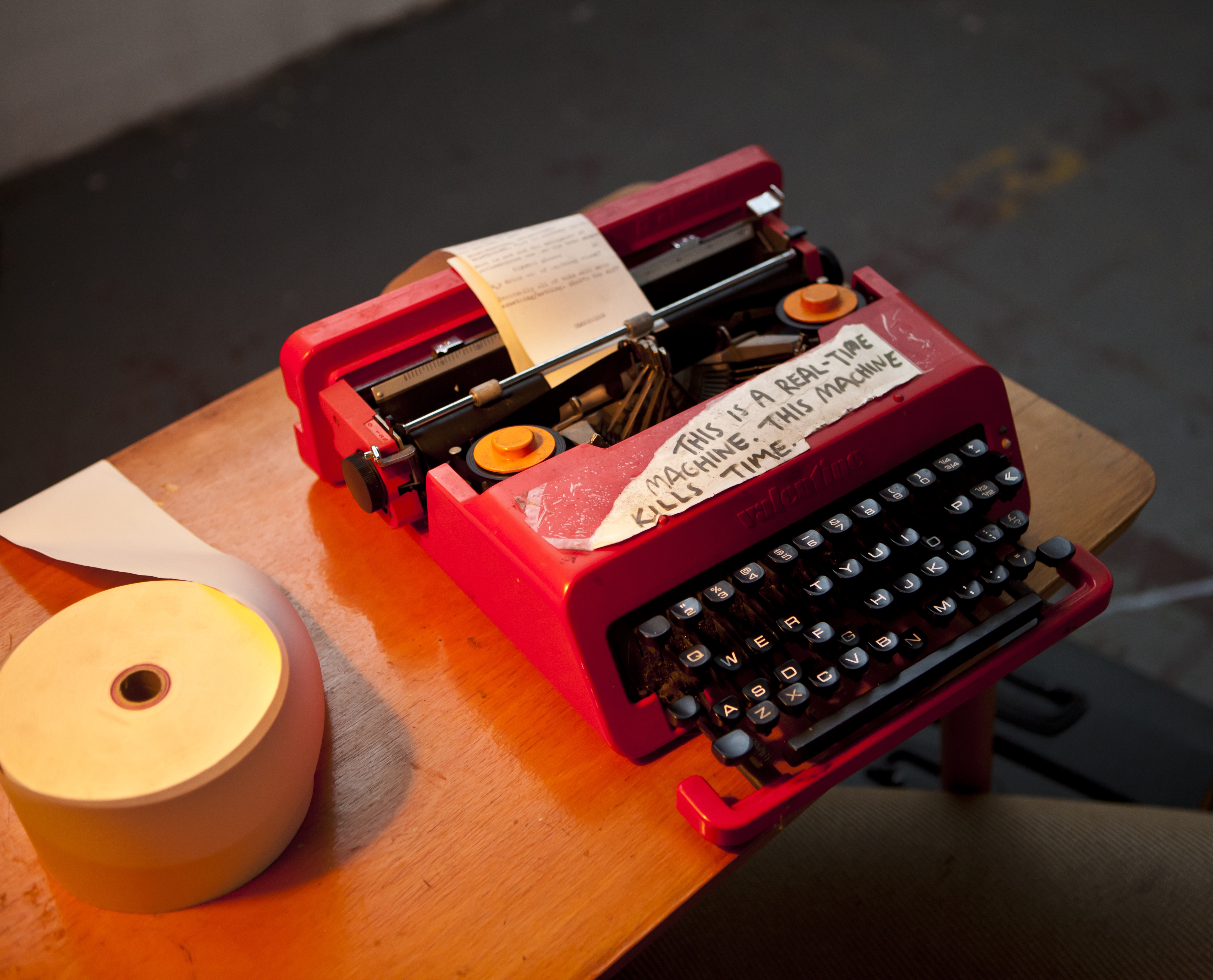BCC (for Brian Fuata)
Performance as part of “Paper Waits” curated/created by Brian Fuata -performed at Knulp Gallery on the occassion of the exhibition entitled “Blind” (curated by Shane Haseman with Brian Fuata, Megan Hansen, Anna Kristensen, Del Lumanta and Robert Pulie.)
A Blind Carbon Copy.The first years of writing on a typewriter (rather than by hand, as in those days I was loathe to use a computer, a born video artist I am not), I was forced to write on carbonless paper in order to make an impression, so bemused was I that the most obvious way, perhaps even the only way to track down a typewriter ribbon was through the internet. By making darker photocopies I could achieve some semblance of legibility, if only in a literal and not in a figurative sense. Obsessing over the visual presence of words and hopelessly frustrated by the authority of the written word, I also experimented with impressions made on hairdressers foil. I must have spent a whole day pouring my heart out onto the foil, in the dingy, fluorescent lit concrete basement that was the sculpture studio, by turns soothing and aggravating my fellow students with the constant arrhythmic drumming of the keys amplified against the metal. At some point in the late afternoon I jumped up from my chair in the sudden realisation that the whole thing was indecipherable, much to the amusement of surrounding friends. There is a certain blindness to this obsessional ocularity that is supposed of us, of our culture, it hides its roots in a kind of skeumorphism, perhaps in the idea of a skeumorphism (the word used to describe visual queues such a floppy disks as save buttons, news-stands as purveyors of written content, as obsolete as both incarnations of technology are right now). I read somewhere that Apple planned to phase out skeumorphisms, after all, people any younger than I am have probably never used a floppy disk... But a CC is a Carbon Copy, a BCC a Blind Carbon Copy, working, as these things always have, just as language always does, as visual or oral or aural (depending on who is speaking). The mistake is to have made a neologism of the skeumorphic, while we talk of this thing supposedly too big for u all using the word “economics,” which really only means “home management,” which, after all, is really all that there is. Etymology is a skeumorphism in reverse, I suppose. Light, of course, moves so much faster than anything else, and so on that level, I suppose it is inevitable that visual graphics, skeumorphisms, would so much more quickly find themselves obsolete, while meaning as communicated interpersonally through sound waves, has the capacity to carry so much more through suggestion, has the capacity to hold onto relevance long after anyone can quite remember what it was. The word on paper has all the capacity of language to survive its own redundancy only because of its hopeless dependency. There is an idea and a word of Derrida's that I always quite liked: "paleonymy," (in Outwork/Prefacing in the book "Dissemination") an example of which was “writing,” which provides an outdated attachment to the graphic, when of course, writing does not have to mean “the written word,” but may encompass any human effort in the composition of language. Of course, the intention behind skeumorphisms was, in a sense, to have a causal relationship with the obsolescence of each of their referents (which some may argue, is not dissimilar to the mode in which language operates) it may be that a floppy disk graphic is to floppy disks what economics is to the home. I have never minded losing large swathes of work to different technologies, I have always known that the safest place for my writing was on paper, but I lose pieces of paper faster than the Apple Corporation can build in redundancy to their products, faster than the relatively short history of the floppy disk or the typewriter. There have always been fantastic scare campaigns surrounding revolutionary technologies, a greater development than we can even imagine, having been the printing press, but great powers do not fall by technology, democratising movements are born and facilitated, bibles rewritten in the common tongue, and then are subject to the subjects, to the blindness of language. I never used to be able to say what I meant and so I wrote poetry, so much of which was lost to my carelessness, and my fear of what I might ultimately communicate. And all in a language which was lost to her subjects.Posted by Z.O'Mahoney at 9:39 PM No comments:
image image: Installation view: Zoe M. Robertson, “Monument to a Deserter (after Paul Thek)”, 2012, at Serial Space Time Machine Festival. Image courtesy Serial Space, photo by Alex Davies.